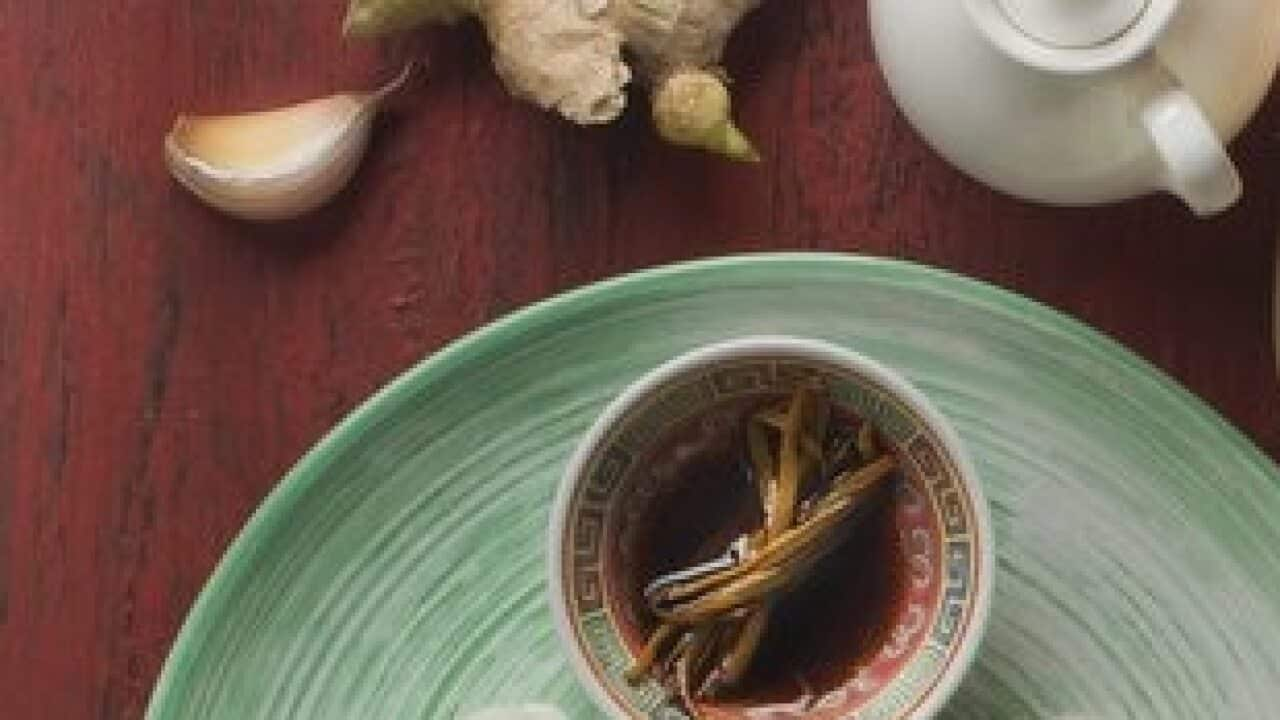In my mum’s culture, it is customary for people to greet each other with the question, sik pau mei? This literally translates to ‘have you eaten your fill, yet?’ which could also be interpreted as ‘are you well?’
Despite being from two very different backgrounds, my parents shared a great passion for food, which brought us together. We were a close-knit family of five.
Growing up in Australia, meals for my dad

Micha and her family. Source: Supplied
But I found connection to my mother’s culture through Sunday yum cha.
This was a post-Sunday morning church treat that occurred once every two months or so. Stacked bamboo steamers of dim sum, dumplings, roast meat and chicken feet, plonked onto a lazy susan and rinsed down with Chinese tea.
My favourite was the cloudlike char siu bao- steamed balls of fluffy white dough encasing sticky sweet, barbequed pork tenderloin. Around the time of Chinese New Year, the dragon dancers would come out to thunderous drums, amongst the tables and I would pray for its menacing head to steer clear of ours.
My parents exposed my sisters and I to food from all over the world. Their curiosity for international cuisine allowed us to travel when we didn’t have the money to hop on a plane. They helped me see food as a great connector. When meeting someone from a different culture, I would often ask them what was usually served upon dinner tables of their motherland before geographically locating where it was. Food had the power to bring together the most dissimilar of people. I remember connecting with a taxi driver from Bulgaria by telling him about the lyutenitsa my mum once made with the help of a friend’s mum’s recipe.
Stacked bamboo steamers of dim sims, dumplings, roast meat and chicken feet, plonked onto a lazy susan and rinsed down with Chinese tea.
My mum’s interest in cooking international dishes enhanced our dinner table experience. She subscribed to Gourmet Traveller and later Delicious magazine. Bookshelves were stacked with food glossies and bulging recipe books were filled with her neat handwriting; a gift to anyone else who sought to follow her carefully written out recipes. Ahead of birthdays, we would stew over mountains of cooking magazines and recipe books for the most coveted of cakes, which, let’s face it, more often than not came out of the Women’s Weekly, Children’s Birthday Cake Book. Once, she made quesadillas and my friend Elisa would not stop going on about them, so her mum had to ask my mum how to make them. A few weeks later, at Elisa’s house, Mrs Poulos returned the favour by serving salty, vinegary vine leaves stuffed with rice and presenting a huge bowl of fresh loukoumades- delicious golden balls of deep fried dough, drizzled in honey and sprinkled with cinnamon. Playdates were a great way to get to know how my friends ate at home and what their dinner tables were like.
Once, she made quesadillas and my friend Elisa would not stop going on about them, so her mum had to ask my mum how to make them. A few weeks later, at Elisa’s house, Mrs Poulos returned the favour by serving salty, vinegary vine leaves stuffed with rice and presenting a huge bowl of fresh loukoumades- delicious golden balls of deep fried dough, drizzled in honey and sprinkled with cinnamon. Playdates were a great way to get to know how my friends ate at home and what their dinner tables were like.

Micha Woodhouse. Source: Supplied
The cardinal sin for all Asian mothers is letting your child go hungry- unless, of course, it’s some form of punishment.
I was the kid who brought the best lunches to school. At first, I was embarrassed by my gourmet sandwiches- especially when I moved schools and dreaded being different from the other kids. I wished mum would hand me lunch money instead, so I could gorge on party pies and sausage rolls, like everyone else.
Not once did I ever open my lunchbox to find a single white bread vegemite sandwich. Only on birthdays did I ever receive such ‘treats’ (four neatly wrapped triangles of fairy bread) alongside the usual contents. As I got older though, my lunches became a source of pride for me, the envy of school friends and held bargaining power. As with many parental habits we don’t like; we learn to appreciate them, love them and eventually miss them.
Even now, when I come home to visit, my mum will excitedly say, “What do you want to eat?”. It is the most loving gift she can offer me.
In my recent adult years, as I I've flipflopped from vegetarianism to pescatarian-ism to flexi-tarian-ism to who- cares-ism. But during the lockdown in Melbourne in 2020, I returned to food with gratitude. I share the passion and enthusiasm for food that my parents infused in me, with my housemates every week and relish in the joy of home cooked food.
Micha Woodhouse is a placemaker, architect, teacher and freelance writer.
This story was originally entered in the 2020 and forms part of a special SBS Voices and SBS Food collaboration series: 'Food of My Childhood'.








